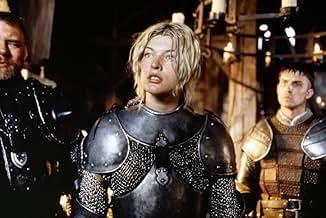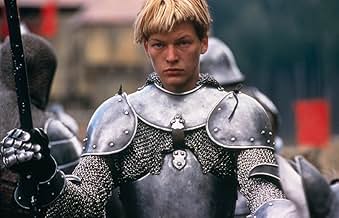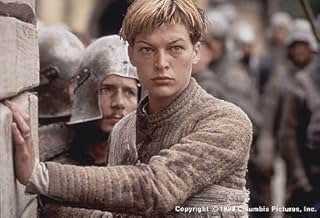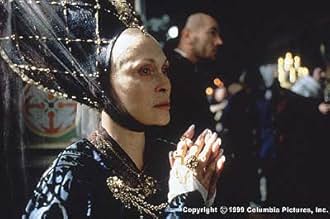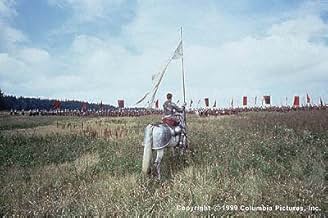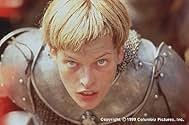A young girl receives a vision that drives her to rid France of its oppressors.A young girl receives a vision that drives her to rid France of its oppressors.A young girl receives a vision that drives her to rid France of its oppressors.
- Awards
- 5 wins & 13 nominations total
- Look Out
- (as Stephane Algoud)
- Director
- Writers
- All cast & crew
- Production, box office & more at IMDbPro
Featured reviews
So I popped this flick in the DVD player not expecting much. Sacrée merde! What a surprise. It seems, stripped of her futuristic-mutant-motorcycle-riding-vampire persona, she's really quite good. This film--probably the least glamorous of her entire repertoire--really gives her a chance to show her full dynamics. I can't say much more without giving away the plot, so I'll drop it for now.
Now on to the director Luc Besson. For the first half hour or so, he seems to suffer from "I wanna be Kenneth Branagh" syndrome (which is almost as painful as the avian flu). We get a dozen scenes of someone running down a corridor with the camera chasing behind. We get a dozen overhead-camera-twirly shots of someone lying on the ground. We get so many crane shots, you start thinking you're on a construction site. What's wrong with all this? I'll tell you. When the camera swings & sways too much it detracts from the actors' performances. Sure it adds visual drama, but so can a good fireworks scene (with just as much subtlety).
But suddenly, right around the halfway mark, the camera man simmers down. The whole tone of the film changes, becomes darker and more intense, relying on the power of the actors instead of the gimmicky camera-work. This works brilliantly, especially when Dustin Hoffman finally steps in.
This is the break that takes the movie in an entirely different (and possibly offensive) direction. It looks like some IMDb reviewers weren't too happy. I'm sure plenty of others got bored (because the swordfights stop). But me, I thought this change of mood was what made the movie. Suddenly it becomes a spooky, psychological thriller with a lot of great dialogue and a ton of good acting. THIS is the payoff.
My biggest gripe with the movie is that after seeing the 2nd half, I kept saying to myself "why the hell did Besson waste so much time getting here?" There were a few too many insignificant fluff scenes in the beginning (like the virginity test lol) that should have been replaced with more of the powerful Milla-Dustin dialogue toward the end.
I won't comment on historical accuracy, religious sacrilege, lack-of-realism or the fact that there were a few too many American accents for 15th century France. These flaws fall by the wayside if you're instead paying attention to the complex conflict brewing in Milla's character. This is really her movie, and a damn good one at that. Like my title implies, it's good enough to make me want to give Ultraviolet another try.
There really was a very religious young girl who was considered a savior to France during The Hundred Years War. Although things may have eventually sorted themselves out the same way without her. Three years after her birth, the new tactics of the English archers were responsible for arguably the most one-sided battle in military history at Agincourt. The result was credited to Henry V's piety and he got a great passage in Shakespeare. The French aristocracy was almost wiped out by the battle and the English became solidly entrenched in France. Fourteen years later a new generation of French nobility was beginning to assert itself and it was the English and their French allies who were having leadership problems.
Both countries were Catholic at the time and both claimed that God was on their side, a bit like the football player who thanks God for the victory over another team that apparently God did not favor.
Although there are records of both of Joan's trials (her Condemnation Trial and her Rehabilitation Trial) both proceedings had their own political agenda and should be taken with a grain of salt. Besson's film seems to follow the generally accepted version of the story but takes obvious liberties with Joan's mental condition and visions. There is no way to prove or disprove any of this so it is probably as plausible as any other speculation.
What hurts "The Messenger: The Story of Joan of Arc" is that Besson's best scenes are at the very beginning and set too high a standard for the remainder of the film. Jane Valentine is wonderful as the young Joan and Besson shows that his directing skills with young actors was not confined to Natalie Portman's performance in "Leon". This early stuff features some of the most interesting scene juxtaposition that you are likely to see in any film. IMHO it gets off to a better start than any film in cinema history. And the sequence where the young Joan is standing on a hill watching as the English burn her village is as visually stunning as anything ever filmed.
But once Milla Jovovich's grown-up Joan takes over most viewers will find it difficult to stay focused on the story. It's not miscasting, Jovovich is noted for aggressive and daring performances (see "The Dummy") rather than subtlety and nuance, making her a good fit for the take Besson wanted on Joan's personality. The problem is that while a viewer could identify with the young Joan, the older Joan is just repellent. Her story should be inspirational and tragic. Instead it is a bunch of comic book battle scenes and comical melodrama.
But it is worth watching for the production design and the beginning sequences.
Then again, what do I know? I'm only a child.
Well that's what you would think all Besson's film amounts too, given the hate and general negativity that pours down on it from many of the worlds cinematic sources. Well, look, it's not brilliant, but is it really the devil that many have painted it as? Not so say I. It's about as subtle as a sledgehammer all told, but Besson's study of the iconic/infamous waif who did indeed expel the British hoards has gusto by the shed load. He nicely crafts the 15th century lands from which to tell his story, and then, to quote someone from another period epic, unleashes hell. Literally. Yep the British armies are stereotypically vile {I bet Mel Gibson loves the Brit portrayals here}, and the blood that is shed is vicious and borderline sick. But it works well in the context of Jeanne's prominent rise and subsequent fall, with her religious confliction deftly blending in with the blood being shed in the pursuit of liberation. Visually the film is a treat, and for action construction it holds up to be one of the better modern day historical epics in that department. But where's the substance?
Ah, there's the big problem with the movie. Besson and his co-writer Andrew Birkin are so pre-occupied with the horrors of war and Jeanne's leadership qualities, they turn the rest of the film into a skeleton in need of flesh. And it's actually Jovovich who suffers the most. She's great when she's screaming and launching into the enemy, taking an arrow hit with grace and dedication . But there's been no character depth laid out, so Jovovich's Jeanne just comes across as a moody teenager out to cause trouble. We need to have some insight into her troubled predicament and what drives her on, not the scantily written filler moments that actually are just appetisers to blood letting battles. There 's also annoyances when the film slips into moments of modern day speak, it's a crass and lazy oversight by the makers to think that we wouldn't notice such speak in 15th Century France. Besson surrounds Jovovich with some fine acting talent tho, even if some are a tad underused. Rolling out are John Malkovich, Dustin Hoffman, Faye Dunaway, Vincent Cassel, Timothy West, Desmond Harrington and the always watchable, and scary, Tcheky Karyo.
So a bit hollow it be, but on the outside it's a ripper. Visceral, explosive and yes, fun too. 7/10
But sadly it is flawed. Much to my chagrin, as I do admire most of his work, Dustin Hoffman's performance is, to put it mildly, a big downer for the film. He is clearly at a loss as to what his character or purpose is in the film. His performance is uncomfortable and distracting. Despite his lower appearance in the credits, his role was critical in the film. It's a real detractor. But aside from this one glaring flaw, the film is of the highest quality on all accounts. I was riveted from beginning to end and wouldn't hesitate to watch it again. Because of it's one casting/directing flaw I have to rate it an 8 but on every other count it's a 10.
Did you know
- TriviaMost of the characters, including Joan's Captains, were real people. Giles de Rais was a real person who, after the war and Joan's death, retired to his lands. Many years later, he was arrested for the murder of more than 100 young boys, and executed. Some historians believe that his crimes were the basis for the French fairy tale "Bluebeard," about a rich man who murders his wives and hides their bodies in his grand house.
- GoofsJoan's older sister was not murdered by soldiers, but survived to adulthood and married. She died ultimately in childbirth.
- Quotes
Joan of Arc: I've always been faithful to God and I've followed everything He's ever said and I've done everything He's ever asked me to do.
The Conscience: God asked you to do something?
Joan of Arc: Yes. Yes, lots of things.
The Conscience: You mean God said, "I need you, Jeanne."
Joan of Arc: No. But He sent me signs.
The Conscience: Signs? What signs?
Joan of Arc: The wind. The wind. And the clouds, ringing!
The Conscience: Ringing clouds?
Joan of Arc: The dance. The dance. The dance. The dance.
The Conscience: The dance.
Joan of Arc: The sword! The sword lying in the field. That was a sign.
The Conscience: No. That was a sword in a field.
Joan of Arc: No. No, that was a sign!
The Conscience: No. That was a sword. In a field.
Joan of Arc: It can't just get there by itself! It can't. A sword just doesn't get there by itself. It can't just get there by itself.
The Conscience: True. Every event has an infinite number of causes, so why pick one rather than another? There are many ways a sword might find itself in a field.
- Alternate versionsThe European release was 10 minutes longer than the US theatrical version, which omits, among others, the scene where Joan's virginity is tested before the court of King Charles VII. The longer version has been released in the USA on DVD.
- SoundtracksMy Heart Calling
Lyrics and Music by Éric Serra and Achinoam Nini
Produced by Éric Serra
Performed by Achinoam Nini
With the Special Authorization of Interscope/Geffen
- How long is The Messenger: The Story of Joan of Arc?Powered by Alexa
Details
- Release date
- Countries of origin
- Languages
- Also known as
- Juana de Arco
- Filming locations
- Bruntal, Czech Republic(Fort of the Tourelles)
- Production companies
- See more company credits at IMDbPro
Box office
- Budget
- $85,000,000 (estimated)
- Gross US & Canada
- $14,276,317
- Opening weekend US & Canada
- $6,360,968
- Nov 14, 1999
- Gross worldwide
- $66,976,317
- Runtime2 hours 38 minutes
- Color
- Sound mix
- Aspect ratio
- 2.39 : 1
Contribute to this page




